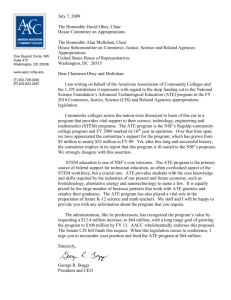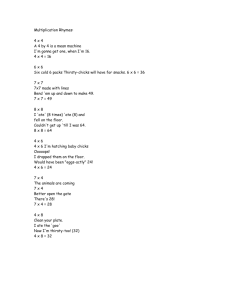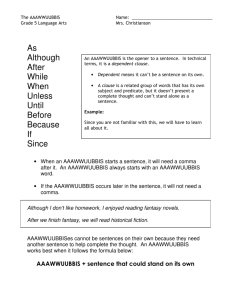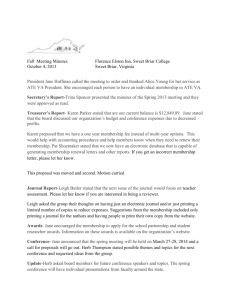ATE Core Courses - Programs of Study
advertisement
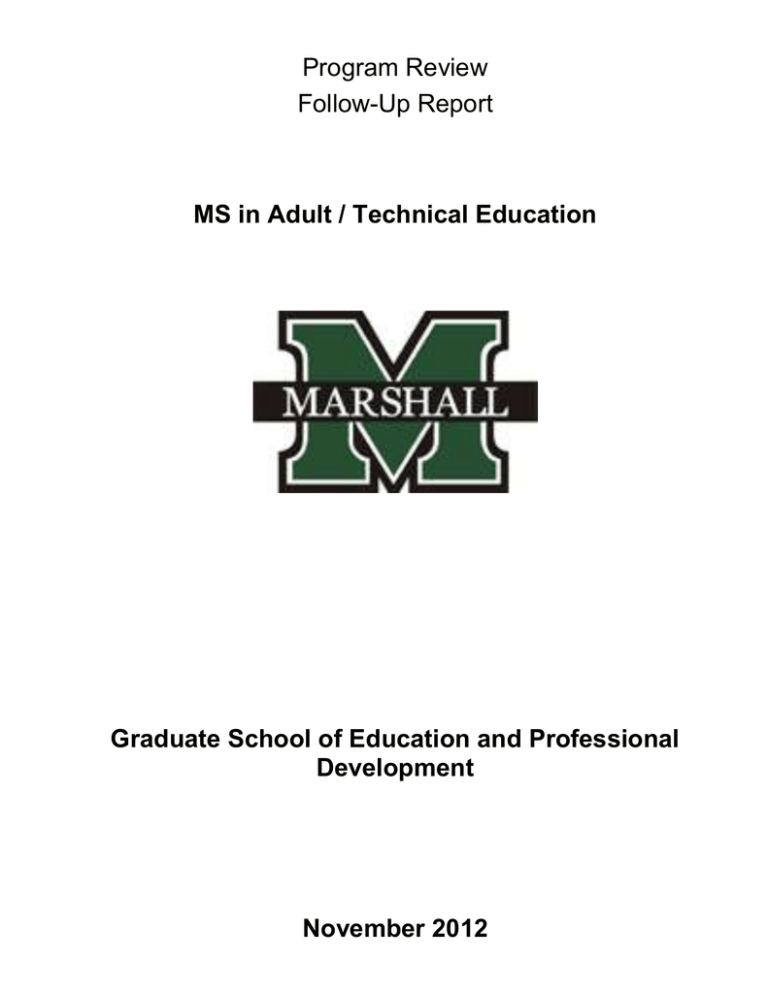
Program Review Follow-Up Report MS in Adult / Technical Education Graduate School of Education and Professional Development November 2012 MARSHALL UNIVERSITY Program Review Marshall University Date: Fall 2012 Program: MS – Adult/Technical Education Date of Last Review: April 2012 Recommendation Marshall University is obligated to recommend continuance or discontinuance of a program and to provide a brief rationale for the recommendation. Recommendation Code (#): 1. Continuation of the program at the current level of activity; or 2. Continuation of the program at a reduced level of activity or with corrective action: Corrective action will apply to programs that have deficiencies that the program itself can address and correct. Progress report due by November 1 next academic year; or 3. Continuation of the program with identification of the program for resource development: Resource development will apply to already viable programs that require additional resources from the Administration to help achieve their full potential. This designation is considered an investment in a viable program as opposed to addressing issues of a weak program. Progress report due by November 1 next academic year; or 4. Development of a cooperative program with another institution, or sharing of courses, facilities, faculty, and the like; or 5. Discontinuation of the program Rationale for Recommendation: (Deans, please submit the rationale as a separate document. Beyond the College level, any office that disagrees with the previous recommendation must submit a separate rationale and append it to this document with appropriate signature.) ______1______ _________________________________________________ ______________ Recommendation: Signature of person preparing the report: Date: _____1______ _ ________________________________________________ ______________ Recommendation: Signature of Program Chair: Date: _____1 _____ __________________________________________________ ______________ Recommendation: Signature of Academic Dean: Date: ________ __________________________________________________ ______________ Recommendation: Signature of Chair, Academic Planning Committee: (Baccalaureate pgms only) Date: ________ _________________________________________________ ______________ Recommendation: Signature of President, Faculty Senate/ Chair, Graduate Council: Date: ________ _________________________________________________ ______________ Recommendation: Signature of the Provost and Senior Vice President for Academic Affairs: Date: _______ __________________________________________________ ______________ Recommendation: Signature of the President: Date: ________ _________________________________________________ ______________ Recommendation: Signature of Chair, Board of Governors: Date: College/School Dean’s Recommendation Deans, please indicate your recommendation and submit the rationale. Recommendation: Continuation of the program at the current level of activity. Rationale: (If you recommend a program for resource development identify all areas for specific development) The move of the Adult and Continuing Education program to the Graduate School of Education and Professional Development represented the beginning of a new approach to academics within this program. A number of issues required extensive attention to resolve problems, establish academic credibility and move the program forward to address the needs of students and the community. Changes of this magnitude will certainly take more than a year to accomplish; the attached report, however, taken from the strategic plan designed by the program director, clearly demonstrates that significant progress has been made. With continued progress in this direction, the program should be able to fulfill the vision of a valuable, respected venue for graduate students who wish to work in field related to providing training and education for adult learners. _______________________________________ ________________________ Signature of the Dean Date Marshall University Board of Governors Adult and Technical Education Follow-Up Report 2012-13 The Adult and Technical Education (ATE) program was moved from the College of Education to the Graduate School of Education and Professional Development effective August 2011. The material prepared for the 2012 Five Year Report to the Board of Governors was developed in October of 2011. At that time, the previous annual reports, which should have formed a basis for the Five Year Report, were inconsistent, incomplete or non-existent. To address the weaknesses of the program, the following corrective actions were required (A summary of the changes is available in Appendix A): Corrective Actions from 2012 Report – detailed information for each of the following actions can be found in the Appendices 1. The program will develop written, measurable program learning objectives. Developed a set of four courses that serve as a core for all areas of emphasis within the MS in ATE degree program. (Plans of Study reflecting the core may be referenced in Appendix B) The program is currently developing a portfolio-based program assessment based on the objectives of the four core courses. This task is approximately 50% complete. (Graduate Council approved October 2012. Documents available upon request.) The program currently is designing a plan to use assessment data to evaluate the program. More in-depth discussion will occur at the October 2014 planning retreat. (See Appendix D) 2. The program will reduce the number of electives. Programs of study were rewritten to reflect the four core courses with fewer elective options. This task is complete and sample plans of study are in Appendix B. The program has moved from using a thesis and comprehensive examination as a culminating assessment to a portfolio assessment process. (Graduate Council approved October 2012. Documents available upon request.) 3. The program will develop master syllabi for core courses that address program learning objectives. Master Syllabi reflecting the objectives to be covered in each course have been completed for the four core courses. These syllabi are included in Appendix C. 4. The program will develop and install assessment plans and activities that provide data for program improvement. A set of four courses that serve as a core for all areas of emphasis within the MS in ATE degree program have been developed. (See Appendix B) Master Syllabi, reflecting the objectives to be covered in each core course, have been completed for the four core courses. (See Appendix C) The program is currently developing a portfolio-based program assessment based on the objectives of the four core courses. This task is approximately 50% complete. (Required changed approved by Graduate Council October 2012. Documents available upon request) The program is designing a plan to use assessment data to evaluate the program. More in-depth discussion will occur at the October 2014 Program Assessment Retreat. (See Appendix D) 5. The program will examine programs for viability and reduce the number of areas of emphasis. The program has changed program admission standards. The program has officially suspended admission to the Interdisciplinary and Occupational Leadership Areas of Emphasis. This leaves the program with three areas of emphasis; Training and Development, Adult Education, and Career and Technical Center Teaching. (Suspensions approved by Graduate Council in September and October, 2012. Documents available upon request.) APPENDIX A ATE PROGRAM CHANGES SUMMARY TASK SEMESTER STATUS Spring 2011 Identify WVU-Tech issues Completed Spring 2011 Identify Key Players Completed Spring 2011 Become familiar with ATE Programs of Study Completed Spring 2011 Determine licensure procedures for WVU-Tech CTE teachers Completed Spring 2011 Identify course names and descriptions and match with programs Completed Spring 2011 Construct database of enrollment history for ATE courses Completed Spring 2011 Meet with ATE faculty/staff Spring 2011 Review current Programs of Study to see where they need additional rigor Spring 2011 Build course rotation for ATE programs Completed Completed Core courses identified – assessments plans being developed Completed Spring 2011 Construct Fall ATE schedule Completed Spring 2011 Fall 2011 Spring 2011 Spring 2011 Spring 2011 Spring 2011 Eliminate MU faculty being listed for scores of classes with no or very low enrollment Make WVU-Tech faculty Instructors of Record for MU courses they are teaching Revise and submit new Ed.S. program for ATE using core from GSEPD program to eliminate small enrollment courses Restrict 700 level courses to Ed.S. & Ed.D. students for 2011 Develop new Ed.D. Area of Emphasis under Educational Leadership in Community Technical College Administration – Use ATE courses in core Study admission requirements for needed upgrades ATE Officially moves to GSEPD Fall 2011 Determine what is needed for ATE Secretary to be able to handle EPAF/PARs Decide on courses for CTE teaching Area of Emphasis in MS-ATE Spring 2011 Spring 2011 Spring 2011 Spring 2011 Summer 2011 Fall 2011 Spring 2011 Add new Area of Emphasis in CTE teaching to MS in ATE to accommodate CTE/WVU-Tech students and allow tracking Establish procedures for handling admissions & POS paperwork for fall 2011 Develop procedures for ATE Secretary in Huntington EVIDENCE Completed Completed Completed Completed Completed Completed Change in Ed.S. admissions. Plans for other admission changes to all ATE graduate programs will be made Fall 2011 BOG Issue Unnecessary Completed Completed Completed Unnecessary Monitor Fall 2011 ATE enrollments and schedule offerings. Add sections as Completed necessary. Watch for addition of courses to schedule Check on status of undergrad ATE program – determine procedures Completed needed to stop enrollment Improve service to WVU-Tech CTE students in MU ATE program In Progress 90% Determine budget facts for ATE Completed Student’s work experience must be in field related to ATE program for admission to the post-masters Ed.S. program 5 In Spring 2013, additional requirement of minimum TOEFL score of 55 for all ATE graduate programs will be requested for approval Spring 2011 Fall 2011 Fall 2011 Spring 2011 Spring 2011 Spring 2011 Spring 2012 Spring 2011 Fall 2011 Fall 2011 Fall 2012 Fall 2012 Fall 2012 Eliminate “Statewide” designation for some ATE courses – require use of MUOnline software for delivery Tighten admission standards to enforce what is in place – Curb number of “Provisional” admissions Use MAT or GRE score to make admission determinations if UGPA is insufficient Eliminate scheduling of arranged courses in ATE Reduce elective hours in some ATE programs of study in order to establish clear objectives and outcomes for the programs Work with WVU-Tech faculty to develop course rotation that will result in reduced course offerings per term yet continue to meet student needs The program will seek Provost permission to stop enrollment in ATE Interdisciplinary Studies AofE Find assistance for ATE faculty that wish to develop courses in MUOnline Do catalog copy changes to reduce ATE Ed.S. program from two to one program Improve service to ATE students – Develop plan for phone coverage – Monitor operation to assure compliance with student service directive Improve Summer offerings to real courses – reduce significantly or eliminate arranged sections. Move to 12 week session Develop online Training and Development using existing AofE courses Completed Completed Completed Completed In Progress 75% Completed Completed In Progress 50% Completed Completed In Planning Stalled 0% The program will develop a set of 4 courses that will serve as the core for all MS degrees in ATE ATE 550* Interpersonal Skills ATE 600* Aspects of Training & Dev Completed 1,4 ATE 603* Intro to Adult Ed ATE 656* Instruct Planning Fall 2012 Fall 2012 Spring 2013 Master Syllabi will be developed for the 4 core courses. These will reflect the objectives to be covered in each course. At the direction of the BOG to “examine programs for viability and reduce the number of areas of emphasis” the program will move to officially suspend enrollment in the Interdisciplinary and Occupational Leadership Areas of Emphasis. This will leave the program with three areas of emphasis;Training and Development, Adult Education, and Career and Technical Center Teaching The program will develop a Portfolio-based program assessment using the objectives of the 4 core courses. Completed Completed In progress 50% Spring 2013 Spring 2013 Fall 2014 Programs of study will be re-written to reflect the 4 core courses and fewer elective options. The program will begin eliminating the thesis and comprehensive examinations as capstone assessments The program will begin to use assessment data to evaluate its programs. This planning for this process will occur at the annual 2014 October Program Assessment Retreat. In Progress 80% In progress – waiting on approvals 95% In planning 0% 3,4 5 1,4 These changes have been passed by the MU Graduate Council The faculty have outlined a transition plan for moving to the portfolio and are meeting with current students to allow a change from a comp to the portfolio process if the student so desires 2 2 1, 4 These changes have been passed by the MU Graduate Council APPENDIX B ATE Core Courses - Programs of Study MARSHALL UNIVERSITY GRADUATE SCHOOL OF EDUCATION AND PROFESSIONAL DEVELOPMENT ADULT AND TECHNICAL EDUCATION MASTER OF SCIENCE DEGREE – TRAINING AND DEVELOPMENT PLAN OF STUDY ADMISSION REQUIREMENTS: In addition to Marshall University’s requirements for admission, the following criteria must be met for admission to the Leadership Studies program. Admission to the program also requires an undergraduate Grade Point Average (GPA) of 2.75 or higher on a 4.0 scale for all previously completed undergraduate work. STUDENT REQUIREMENTS: All students follow a program Plan of Study and must maintain a cumulative Grade Point Average (GPA) of 3.0. Course credit transferred from an accredited institution(s) must be approved by the Program Director prior to completion of the Plan of Study. Failure by the student to return the signed Plan of Study within 30 days will automatically indicate acceptance of its terms. The Plan of Study must be completed for all admitted students within the first semester of enrollment. Students may complete 33 hours in the thesis option or 36 hours in the non-thesis option to satisfy the degree requirements. Students must pass a written comprehensive assessment during the final semester of their coursework. GRADUATION REQUIREMENTS: Students must apply for graduation by the published deadline in the semester they expect to graduate. All coursework included as part of a Plan of Study must not be more than seven years old at the time of graduation. COURSE NUMBER Course Name Credit Hours Course Availability Required Courses ATE 550* ATE 600* ATE 603* ATE 656* ATE 609 Interpersonal Skills in the Workplace Aspects of Training and Development Intro to Adult Ed & Adult Learners Instructional Planning for Adult Populations Developing Training in Bus. And Indus. ATE 628 Environmental and Personal Aspects ATE 652 Field-Based Job Analysis and Curriculum Design ATE 661 Practicum in Adult and Continuing Education ATE 671 Evaluation of Adult and Technical Education ATE 677 Research Methodology and Design ATE 685 Capstone Total Degree Hours * ATE Core Required Courses 3 3 Spring, Summer (Even) Fall, Summer (Odd) 3 Fall, Summer (Even) 3 3 Spring, Summer (Odd) Spring 3 Fall 3 Fall 3 Spring/Fall/Summer 3 Spring 3 Fall 3 33 Spring/Fall/Summer Semester Taken Grade MARSHALL UNIVERSITY GRADUATE SCHOOL OF EDUCATION AND PROFESSIONAL DEVELOPMENT ADULT AND TECHNICAL EDUCATION MASTER OF SCIENCE DEGREE –CAREER AND TECHNICAL CENTER TEACHING PLAN OF STUDY ADMISSION REQUIREMENTS: In addition to Marshall University’s requirements for admission, the following criteria must be met for admission to the Leadership Studies program. Admission to the program also requires an undergraduate Grade Point Average (GPA) of 2.75 or higher on a 4.0 scale for all previously completed undergraduate work. STUDENT REQUIREMENTS: All students follow a program Plan of Study and must maintain a cumulative Grade Point Average (GPA) of 3.0. Course credit transferred from an accredited institution(s) must be approved by the Program Director prior to completion of the Plan of Study. Failure by the student to return the signed Plan of Study within 30 days will automatically indicate acceptance of its terms. The Plan of Study must be completed for all admitted students within the first semester of enrollment. Students may complete 33 hours in the thesis option or 36 hours in the non-thesis option to satisfy the degree requirements. Students must pass a written comprehensive assessment during the final semester of their coursework. GRADUATION REQUIREMENTS: Students must apply for graduation by the published deadline in the semester they expect to graduate. All coursework included as part of a Plan of Study must not be more than seven years old at the time of graduation. Course Number ATE 550* ATE 600* ATE 603* ATE 656* Course Name Credit Course Semester Hours Availability Taken Grade Required Core ATE Courses Interpersonal Skills in the Workplace 3 Spring, Summer (Even) Aspects of Training & Dev 3 Fall, Summer (Odd) Intro to Adult Ed & Adult Learners 3 Fall, Summer (Even) Instruct Planning for Adult Pops 3 Spring, Summer (Odd) WV Licensure Courses ATE 508 ATE 511 ATE 524 ATE 548 ATE 631/637 ATE 650 Teaching Methods in Career and Technical Education Introduction to Career and Technical Education Safety in Career and Technical Education App of Basic Skills in Career and Tech Education Computer Applications Career Education Curriculum Development ATE 673 Assessment in Adult/Technical Education Total Required Hours 3 All 3 All 3 All 3 All 3 All 3 All 3 All 21 Capstone Requirements ATE 685 Capstone Course TOTAL DEGREE HOURS 3 36 Spring/Fall/Summer This program is restricted to persons enrolled in the West Virginia Career and Technical Education licensure program. Students must complete all required courses before registering for ATE 618 * = Required ATE Core Courses MARSHALL UNIVERSITY GRADUATE SCHOOL OF EDUCATION AND PROFESSIONAL DEVELOPMENT ADULT AND TECHNICAL EDUCATION MASTER OF SCIENCE DEGREE – ADULT EDUCATION PLAN OF STUDY ADMISSION REQUIREMENTS: In addition to Marshall University’s requirements for admission, the following criteria must be met for admission to the Leadership Studies program. Admission to the program also requires an undergraduate Grade Point Average (GPA) of 2.75 or higher on a 4.0 scale for all previously completed undergraduate work. STUDENT REQUIREMENTS: All students follow a program Plan of Study and must maintain a cumulative Grade Point Average (GPA) of 3.0. Course credit transferred from an accredited institution(s) must be approved by the Program Director prior to completion of the Plan of Study. Failure by the student to return the signed Plan of Study within 30 days will automatically indicate acceptance of its terms. The Plan of Study must be completed for all admitted students within the first semester of enrollment. Students may complete 33 hours in the thesis option or 36 hours in the non-thesis option to satisfy the degree requirements. Students must pass a written comprehensive assessment during the final semester of their coursework. GRADUATION REQUIREMENTS: Students must apply for graduation by the published deadline in the semester they expect to graduate. All coursework included as part of a Plan of Study must not be more than seven years old at the time of graduation. COURSE NUMBER Course Name Credit Hours Course Availability Semester Taken Required Courses ATE Interpersonal Skills in the 550* Workpl ATE Aspects of Training & Dev 600* ATE Intro to Adult Ed & Adult 603* Learners ATE Instruct Planning for Adult 656* Pops ATE Developing Train Bus s & 609 Industry ATE Lit of Adult & Cont. Ed. 618 ATE Adult Instr: Envior. & Pers 628 Asp. ATE Practicum in Adult & Cont 661 Ed ATE Evaluation of Adult & Tech 671 Ed ATE Research Methodology & 677 Design ATE Capstone Course 685 TOTAL DEGREE HOURS 3 3 Spring, Summer (Even) Fall, Summer (Odd) 3 Fall, Summer (Even) 3 3 Spring, Summer (Odd) Spring 3 Summer 3 Fall 3 Spring/Fall/Summer 3 Spring 3 Fall 3 Spring/Fall/Summer 33 * Core Courses Capstone course must be taken in the last semester of the student’s program. Grade APPENDIX C Master Syllabi for Core Courses MASTER SYLLABUS ATE 603 – Introduction to Adult Education and Adult Learners STANDARD: Students will develop an understanding of the field of Adult Education that includes a critical awareness of the contextual factors influencing the field. These factors include its history, organizational constraints, leaders, competing forces, contemporary issues, and role in a postmodern democratic society. CATALOG DESCRIPTION: Designed to acquaint the student with the field of adult and continuing education, its foundations and development in this country and future trends. TOPICS Adult learning in contemporary society Adult learning theory and models Newer approaches to adult learning Learning and development OBJECTIVES 1. Generalize about the history of adult and higher education in the US. 2. Identify the different philosophical perspectives of adult education and the major researchers/writers related to each. 3. Evaluate the structures, goals, objectives, processes, and practices of various adult and continuing education programs. 4. Explore the relevant physiological, psychological, and sociological factors that affect adult learning. 5. Identify current research areas reported in the literature related to adult development and learning. 6. Discuss the major components and techniques that differentiate instructional methods appropriate for children and youth from those appropriate for adults as well as the major stages of adult development. 7. Articulate a personal philosophy of adult education and support lifelong learning. 8. Discuss the social context and globalization of adult learning. BIBLIOGRAPHY Barbazette, J. (2006). Training needs assessment. Methods, tools and techniques. San Francisco, CA: Pfeiffer. Barkley, E. F., Cross, K. P., & Major, C. H. (2005). Collaborative learning techniques. A handbook for college faculty. San Francisco, CA: Jossey-Bass. Caffarella, R. S. (2002). Planning programs for adult learners. (2nd ed.). San Francisco, CA: JosseyBass. Davis, B. (1993). Tools for teaching. San Francisco, CA: Jossey-Bass. Dean, P., & Ripley, D. (1998). Performance improvement interventions: Instructional design and training. Silver Spring, MD: The International Society for Performance Improvement. Kirkpatrick, D. (1998). Evaluating training programs. San Francisco, CA: Berrett-Koehler Publishers, Inc. Lang, J. M. (2008). On course: A week-by-week guide to your first semester of college teaching. Cambridge, MA: Harvard University Press. Lee, W.W., & Owens, D. (2000). Multimedia-based instructional design. San Francisco, CA: JosseyBass. Medsker, K., & Holdsworth, K. (2001). Models and strategies for training design. Silver Spring, MD: International Society for Performance Improvement. Meier, D. (2000). The accelerated learning handbook. New York, NY: McGraw-Hill. .Rothwell, W. (1999). Action learning handbook. San Francisco, CA: Jossey-Bass. Russell, L. (1999). The accelerated learning fieldbook. San Francisco, CA: Jossey-Bass. Shrock, S.A., & Coscarelli, W.C.C. (1996). Criterion-referenced test development: Technical and legal guidelines for corporate training and certification. Washington, D.C.: International Society of Performance Improvement. Silberman, M. (1995). 101 ways to make training active. San Francisco, CA: Pfeiffer. Sousa, D. (2006). How the brain learns. (3rd ed.). Thousand Oaks, CA: Corwin Press. Stolovitch, H., & Keeps, E. (2002). Telling ain’t training. Alexandria, VA: ASTD. Taylor, K., Marienau, C., & Fiddler, M. (2000). Developing adult learners. San Francisco, CA: JosseyBass. Vella, J. (1994). Learning to listen, learning to teach. San Francisco, CA: Jossey-Bass. Vella, J. (2000). Taking learning to task. Creative strategies for teaching adults. San Francisco, CA: Jossey-Bass. Vella, J., Berardinelli, P., & Burrow, J. (1998). How do they know they know? San Francisco, CA: Jossey-Bass. Zull, J. E. (2002). The art of the changing brain. Enhancing the practice of teaching by exploring biology of learning. Sterling, VA: Stylus. MASTER SYLLABUS ATE 600 – Aspects of Training and Development STANDARD- Students will comprehend the influences on Training and Development programs and their implications for practice. CATALOG DESCRIPTION- Overview of the training and development profession and theories that support the profession; emphasis on the variety of solutions used by HRD professionals to help improve individual and organizational performance. TOPICS: 1. Career planning and talent management 2. Managing the learning function 3. Managing organizational knowledge 4. Introduction to Employee 5. Training and Development 6. Strategic Planning & Training 7. Needs Assessments 8. Transfer of Training 9. Training Evaluation 10. Training Methods 11. E-learning and Use of 12. Technology in Training 13. Employee Development 14. Social Issues 15. Systems Theory OBJECTIVES: 1. Analyze how personal characteristics, inputs, outputs, consequences and feedback influence human performance and learning. 2. Identify and explain the components of human resource development. 3. Compare the practices of traditional training methods in terms of their appropriateness for adult learning styles. 4. Evaluate how various training and development methods can support a changing and dynamic work environment. 5. Delineate the legal issues that relate to training and development. 6. Summarize how personal characteristics, inputs, outputs, consequences and feedback influence performance and learning. 7. Examine the roles of various stakeholders involved in the training process. 8. Explain the role of feedback and assessment in the continuous improvement of training and development programs 9. Determine the influence of emerging technologies on training and development programs. 10. Assess the forces influencing the workplace and their influence on training and development needs. 11. Use the essential tenets of career planning to evaluate a program. BIBLIOGRAPHY ASTD Trainer’s Toolkit: Evaluating Results of Training. Alexandria, VA: American Society for Training & Development, 1992. Bright, J. E. H. & Pryor, R. G. L. (2005). The chaos theory of careers: A user’s guide. The Career Development Quarterly, 53, 291-305. Clarke, N. (2003). The politics of training needs analysis. Journal of Workplace Learning, 15, 141153. Doughty, S. (1991) “Three generations of development training”, Adventure Education and Outdoor Leadership 7 4, 7-9 Fleishman, E. A., & Mumford, M. D. (1989) Individual attributes and training performance. In 1. Goldstein (Ed.), Training and development in work organizations: Frontiers of industrial and organizational psychology (pp. 121—182). San Francisco: Jossey-Bass Goldstein, I. L. & Ford, J. K (2002). Training in organizations: Needs Assessment, Development and Evaluation (4th Ed.) Canada: Wadsworth. Kupritz, V. W. (2002). The relative impact of workplace design on training transfer. Human Resource Development Quarterly, 13 (4), 427-447. Rowden, R. W. (2005). Exploring methods to evaluate the Return-on-Investment from Training. Business Forum, 27 (1), 31-36 Springett, N.R. (1987) The Evaluation of Development Training Courses M.Sc thesis (in occupational psychology) MRC/SSRC Social and Applied Psychology Unit Tharenou, P., Saks, A. M., & Moore, C. (2007). A review and critique of research on training and organizational-level outcomes. Human Resource Management Review, 17, 251-273. Zemke, R. E. (1994). Training needs assessment: The broadening focus of a simple concept. In A.Howard and Associates (Eds.), Diagnosis for Organizational Change: Methods and Models (pp. 139-151). New York: Guilford Press. MASTER SYLLABUS ATE 550 – Interpersonal Skills in the Workplace STANDARD – Under development CATALOG DESCRIPTION - Course is designed to provide opportunities to learn in preparation for career success with supervisors, co-workers, clients, and customers. Human relations skills are examined and related to business success TOPICS A framework for interpersonal skill development Understanding individual differences Building self-esteem and self-confidence Interpersonal communication Interpersonal skills for the digital world Developing teamwork skills Group problem-solving and decision-making Cross-cultural relations and diversity Resolving conflicts with others Becoming an effective leader Motivating others Helping others develop and grow Positive political skills Customer satisfaction skills Enhancing ethical behavior Stress management and personal productivity OBJECTIVES: 1. Identify potential opportunities for developing and improving interpersonal skills and explain how interpersonal skills are learned. 2. Specify how personality, mental ability, emotional intelligence, and values differ. 3. Discuss methods and potential opportunities for developing self-confidence, self-esteem, and interpersonal skills. 4. Describe personality, mental ability, cultural, and sex differences in communication. 5. Identify nonverbal communication and analyze nonverbal communication skills. 6. Evaluate how interpersonal skills relate to digital interaction. 7. Demonstrate brainstorming and nominal group techniques in communication. 8. Identify the essential elements of effective teams including group and individual dynamics. 9. Explore cross-cultural skills, differences, and barriers as well as diversity in the workplace. 10. Identify styles of handling conflict, effective techniques for negotiating, and the difference between rational and political decision-making. 11. Examine key leadership traits and illustrate the attitudes and behaviors of an effective leader. 12. Discuss how positive reinforcement, use of recognition, expectancy theory, and being a nurturing positive person relates to the motivation of others. 13. Comprehend the techniques for self-motivation. 14. Determine how to deal with difficult people in the workplace. 15. Explain the tree components of customer service and demonstrate dealing effectively with customer dissatisfaction. 16. Discuss ethical behavior for establishing interpersonal relations, identify job situations that often present ethical dilemmas, and describe a systematic method for making ethical decisions. 17. Explain the symptoms, consequences, personality, and job factors of stress. 18. Indicate work habits, skills, attitudes, and values that enhance or drain productivity. BIBLIOGRAPHY Adler, Ronald B., and Jeanne Marquardt Elmhorst. Communicating at Work: Principles and Practices for Business and the Professions. New York: McGraw-Hill Text, 2002. Baker, Wayne E. Networking Smart. New York: Backinprint.com, 2000. Foster, D. Glenn, and Mary Marshall. How Can I Get Through to You? Breakthrough Communication Beyond Gender, Beyond Therapy, Beyond Deception. New York: Hyperion, 1994. Foster, D. Glenn, and Mary Marshall. How Can I Get Through to You? Breakthrough Communication Beyond Gender, Beyond Therapy, Beyond Deception [sound recording]. New York: Harper Audio, 1994. Goleman, Daniel, Annie McKee, and Richard E. Boyatzis. Primal Leadership: Realizing the Power of Emotional Intelligence. Boston: Harvard Business School Press, 2002. Gudykunst, William B., and Young Yun Kim. Communicating With Strangers: An Approach to Intercultural Communication. New York: WCB/McGraw-Hill, 2002. Gundry, Lisa, and Laurie LaMantia. Breakthrough Teams for Breakneck Times: Unlocking the Genius of Creative Collaboration. Chicago, IL: Dearborn Trade Publishing, 2001. Hargrove, Robert. Mastering the Art of Creative Collaboration. New York: McGraw-Hill, Inc., 1999. Mai, Robert, and Alan Akerson. The Leader As Communicator: Strategies and Tactics to Build Loyalty, Focus Effort, and Spark Creativity. New York: AMACOM, 2003. Maxwell, John C. Relationships 101. London: Thomas Nelson, 2004. Silberman, Melvin L., and Freda Hansburg. Peoplesmart: Developing Your Interpersonal Intelligence. San Francisco: Berrett-Koehler Publishers, Inc., 2000. Simmons, Annette. The Story Factor. Cambridge, MA: Perseus Publishing, 2001. Vengel, Alan A. The Influence Edge: How to Persuade Others to Help You Achieve Your Goals. San Francisco: Berrett-Koehler Publishers, Inc., 2000. MASTER SYLLBUS ATE 656 - Instructional Planning for Adult Populations STANDARD – Under Development CATALOG DESCRIPTION An examination and application of the process involved in the development, operation, and evaluation of adult programs in the community, business, and industry. TOPICS Models of Program Planning Facets of Planning Context Identifying Program Ideas Developing Program Objectives Scheduling and Staffing Assessing Programs for Improvement Preparing for Training of Learning Evaluation Plan Budget Instructional Plan Work Ethics OBJECTIVES 1. Identify and utilize appropriate stakeholders to in develop programs mission, goals and objectives. 2. Identify and respond to learners’ individual and group needs, interests and goals when developing instruction plans. 3. Demonstration the ability to accommodate diverse learning styles, abilities, cultures and experiences when developing instructional material. 4. Utilize the individual’s background and experiences in developing learning experiences. 5. Articulate the need for program planning models when developing instructional programs. 6. Determine the context in which program ideas develop. 7. Design effective instructional plans for adult populations. 8. Devise transfer-of-learning plans that can be incorporated into the instructional plan. 9. Formulate systematic program evaluation. 10. Determine appropriate formatting, schedules and staff needs for a variety of adult educational programs. 11. Prepare budget and marketing plan for education program. 12. Predict future programming needs and communicate those needs to stakeholders. 13. Understand the importance of and apply procedures to conduct a community needs assessment. 14. Specify learning objectives to meet identified needs. 15. Select appropriate resources. 16. Design learning activities. 17. Develop skills for effectively conducting a workshop of training program. 18. Develop effective evaluation techniques. 19. Develop an understanding of distance education. 20. Identify effective methods for distance education and when to apply those methods. 21. Identify and develop appropriate management skills for distance education activities. 22. Develop a philosophical base for adult education programming. 23. Identify various approaches to program planning. BIBLIOGRAPHY Caffarella, R. S. (1985). A checklist for planning successful training programs. Training & Development Journal, 39(3), 81 Caffarella, R. S., & Ratcliff Daffron, S. (2013). Planning programs for adult learners: A practical guide (3rd ed.). San Francisco, CA: Jossey-Bass Dilworth, R., and Willis, R., Action Learning: Images and Pathways, Krieger Publishing Company, 2003 Knowles, M., Self-Directed Learning, Follett Publishing Company, 1975 Reimold, C., & Reimold, P. (2003). The short road to great presentations: How to reach any audience through focused preparation, inspired delivery, and smart use of technology. Hoboken, NJ: John Wiley & Sons, Inc. Song, H., & Kidd, T. T. (2010). Handbook of research on human performance and instructional technology. Information Science Reference Thornton, G. & Mueller-Hanson, R., Developing organizational simulations, Lawrence Erlbaum Associates, 2004 Jacobs, R.. Structured on-the-job training, Berrett-Koehler Publishers, 2003 Rothwell W. & Kazanas, H., The strategic development of talent, HRD Press, 2003 Rothwell, W., Kazanas, H., Palloff, R., Pratt, K., Smith, P., & Ragan, T., 2002 Instructional design: John Willey and Sons, New York APPENDIX D – Assessment Plan for ATE MU Mission MS ATE Mission Master Syllabi Area of Emphasis Objectives (Learner Outcomes) Evaluation of Assessment Data produces change actions as appropriate ATE Continuous Improvement Plan Program Assessments in Core Courses Course Assessment of Student Work Teaching Syllabi

